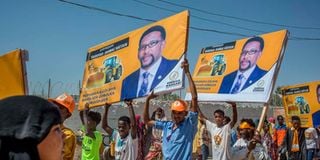Premium
Somaliland is a pearl of democracy, shield it from despotism in the Horn

Supporters hold banners of candidates during a rally in Hargeisa ahead of Somaliland’s elections scheduled for May 31, 2021.
Democracies, they say, are less likely to go to war with each another. A new bout of Cold War-era authoritarianism, however, threatens to push democracy in the Horn of Africa further into recession. Somaliland, a rare pearl of democracy in the region, is trapped in a new wave of militarism in Somalia.
It has all the ingredients of any of the 195 states recognised by the United Nations: a clearly demarcated territory, a permanent population, a legitimate government and relative capacity to defend its sovereignty. Despite remarkable achievements in peace, democracy and economic development, however, this 176,120-square-kilometre territory with approximately 3.5 million is not recognised by any state, 30 years after its declaration of independence from war-torn Somalia on May 18, 1991.
Tomorrow, May 31, 2021, Somaliland will hold its parliamentary and local-government elections to fill 522 local councils. More than 246 candidates will compete for 82 seats in Parliament. Presidential elections will be held in 2022.
Presiding over Somaliland’s electoral democracy is the National Electoral Commission (NEC) comprising seven persons: three nominated by the president, two from the upper house and two nominees from opposition parties.
Risen like a phoenix
It has risen like a phoenix from the ashes to become one of the world’s most democratic seceding powers. Its three registered parties are all set to contest tomorrow’s elections. More than 1,065,000 voters, compared to 639,000 in 2012, are expected to cast their ballots in this year’s election.
But as a country that regards itself as the successor state to British Somaliland, the Republic of Somaliland exemplifies the ebbs and flows of Benedict Anderson’s “imagined communities”.
It rests on the fluidity of the British colonialism’s legacy of indirect rule as a bifurcated system that combined Western modernity with local customary law under clan leaders. In contrast, Italian colonialism in the rest of Somalia imposed a more direct administration that weakened clan elders.
Turbulent stages
Post-colonial Somaliland has seen three turbulent stages. The first was the age of Pan-Somalism in the 1960s, when Somaliland intellectuals and politicians drove the pan-Somali ideology that sought to bring all Somali-speaking people under one sovereignty dubbed “the Greater Somalia”. Upon gaining independence on June 26, 1960, Somaliland joined the rest of Somalia, which gained freedom from Italy on July 1, to form the Somali Republic. Hargeisa’s ideology of ‘Greater Somalia’ stoked conflict with Kenya and Ethiopia, where large Somali minorities reside.
Second is the age of militarism, when efforts to combine British and Italian administrative legacies and to balance power between various clans proved a tall order for Somaliland’s intellectuals and politicians. Feeling disadvantaged in Italian Somalia in 1961, Somalilander military officers spearheaded a coup. From 1969, Somalilanders contested the power of General Mohamed Siyad Barre’s Marxist junta that took power and imposed a brutal military dictatorship.
Ogaden War
During the calamitous Ogaden War with Ethiopia (1978-79), clans in the northeast (now Puntland) and northwest (now Somaliland) formed clan-based guerrilla groups with bases inside Ethiopia to take advantage of Barre’s weakened domestic position. As the regime turned its strong security apparatus on civilians, the army bombed and sacked the north-western towns of Hargeysa and Bur’o in 1988, killing thousands and displacing hundreds of thousands in Ethiopia.
The third was the age of peacemaking that followed the fall of the Barre government in January 1991. As southern Somalia sank into violence, the north embarked on finding peace. A major conference of clan elders, militia leaders and local intellectuals in Bur’o restored region-wide peace and declared Somaliland’s independence.
But infighting by militias from rival Isaaq clans became a governance nightmare for the transitional Somali National Movement in Hargeysa. However, the Borama clan conference in 1993 was the game-changer. It adopted two important charters. One was the peace charter to guide the demobilisation, security and establishment of a police force. The other was the national charter that served as the provisional constitution separating the executive, legislative and judicial branches and also introduced a bicameral parliament consisting of a house of elders (Golaha Guurtida/Guurti) and a house of representatives (Golaha Wakiilada).
Tale of two cities
Somaliland is a tale of two cities. One, in central and western regions, is Lockean: peaceful, democratic and developed. These parts have been characterised by tremendous expansion of infrastructure, private businesses and the educational sector, attracted massive diaspora investments, international NGOs and national development agencies, with Hargeysa becoming Somalia’s second largest city after Mogadishu. Here, the majority, mainly Isaaq clan-family, favour independence.
The other, comprising eastern parts of Somaliland, is Hobbesian: anti-secessionist and underdeveloped. Here, an armed resistance mainly by Darood clan-family, which has not participated in the referendum and subsequent elections, is opposed to secession (supported by Puntland, an autonomous state in northeast Somalia).
Italy, which retains strong ties with the local elite, prefers a united Somalia. Owing to rivalry over Nile water, Egypt supports Somali unity to keep Ethiopia under check. Rival Arab states prefer a united, strong Somalia. The US and most EU countries have steered clear of Somaliland’s recognition. Ditto Djibouti, Ethiopia and Kenya. The African Union has its hands tied by the principle of respect for the continent’s colonial borders.
If Somalia’s 2021 elections put a militaristic government in Villa Somalia, it could attempt to bring Somaliland to heel as an unrecognised entity, provoking new military conflict.
Professor Peter Kagwanja is a former Government Adviser and Chief Executive at the Africa Policy Institute (API).





